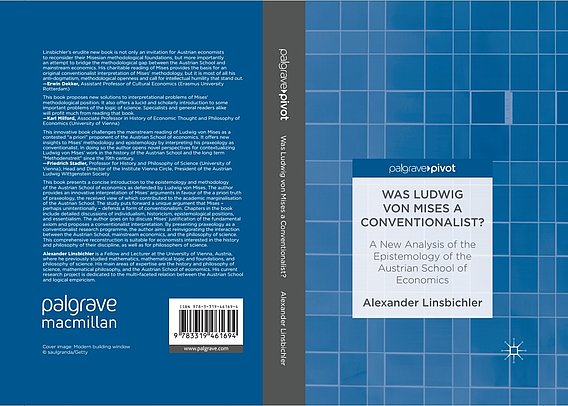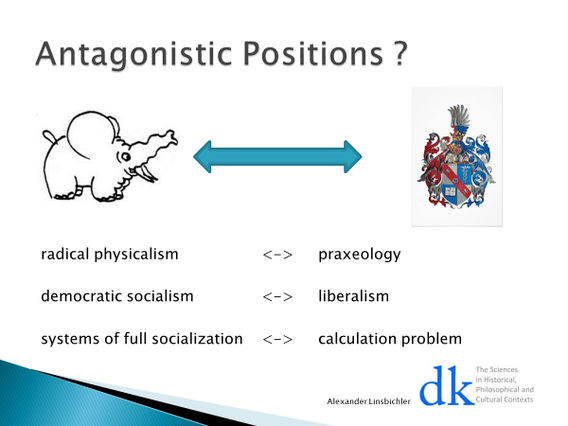Alexander Linsbichler

Alexander was a fellow at the DK “The Sciences in Historical, Philosophical and Cultural Contexts”. During his time at the DK, he also worked as a lecturer at the Department of Economics and the Department of Philosophy (University of Vienna). He worked as a guest researcher at the University of Manchester, Universidade Federal de Santa Catarina, and Duke University. Besides his doctoral dissertation project, his research interests included model theory, history of economic thought, philosophical logic, history of analytic philosophy, and philosophy of science with a focus on social sciences, mathematical logic, and mathematics. A summary of Alexander's PhD thesis is published ![]() here.
here.
Research Project: Otto Neurath and Ludwig von Mises: Economics, Politics, and Epistemology in Viennese Late Enlightenment
Logical Empiricism and the Austrian School of Economics are two of the internationally most influential intellectual movements with Viennese roots. Both have been subject to detailed investigations and reevaluations for the last two decades. But despite their formation in the same cultural milieu of philosophical, scientific, and artistic “coffeehouse circles” in interwar Red Vienna, their relationship has captured surprisingly sparse attention.
My research project is focused on the many-faceted encounter between two of the respective main representatives: logical empiricist Otto Neurath and Austrian economist Ludwig von Mises. According to the received view, they defended radically antithetical positions throughout all spheres of thought and action, including economics (I), politics (II), and epistemology (III). On second sight, however, surprising similarities and potentially future-oriented compatibilities emerge, as my research project intends to substantiate:
(I) In the early socialist calculation debates, Neurath and Mises agreed inter alia that without private ownership of the means of production, there can be no meaningful money prices for them. While Mises concluded that “socialism is the abolition of rational economy” (Mises 1920) and cautioned against ensuing mass poverty, Neurath maintained that calculation-in-kind could remedy the problem. Previous accounts of the exchange between Neurath and Mises tend to suffer from attaching little regard to the different meanings they attach to the question What is meant by rational economic theory (Neurath 1935). In my research project, a reconstruction and critical comparison of their respective conceptions of rationality aims to provide a better understanding of the arguments in the early socialist calculation debates and of later developments such as: economists denying Neurath’s and Mises’ consensus that meaningful money prices cannot be arrived at without private ownership of the means of production; Hayek elaborating Mises’ arguments about dispersed knowledge; ecological economists pursuing Neurath’s ideas in the face of alleged incommensurability of values. While “full socialization” is not a viable option today, contemporary policies like nudging and CO2 certificates repose on specific contentious positions in the debates launched by Neurath and Mises.
(II) In the political sphere, tensions between Neurath’s “democratic socialism” and Mises’ “liberalism in the classic tradition” are obvious. In the context of interwar Europe, they should nevertheless be regarded partial allies. As proponents of “Viennese Late Enlightenment” (Stadler), both Neurath and Mises bucked totalitarian trends and championed democracy based on ethical non-cognitivism. Their deliberations concerning education for the masses or solutions for societal problems brought about by language barriers have by no means lost their significance.
(III) Mises explicated a specific methodology for the social sciences. It is called praxeology and characterizes the approach of one branch of the Austrian School of economics until today. Whereas the standard interpretation of praxeology as extremely aprioristic renders it untenable in the light of modern philosophy, I contend that an alternative defense of praxeology along conventionalist lines is possible and plausible. Mises was no full-fledged conventionalist himself, but elements of his writings point in this direction. I discuss why they are usually disregarded and other aspects of the methodology of the Misesean branch of the Austrian School in Was Ludwig von Mises a conventionalist? – A New Analysis of the Epistemology of the Austrian School of Economics (Palgrave Macmillan 2017), which received these appreciative reviews:
“Alexander Linsbichler’s Was Ludwig von Mises a Conventionalist? marks a significant contribution to and advancement upon the existing literature concerning Mises’s epistemology. Linsbichler reviews the primary and secondary literatures on Mises’s epistemology through the lens of contemporary philosophy of science, and clarifies several confusions that have long confounded these literatures. Possessed of a seemingly encyclopedic knowledge of twentieth-century philosophy of science, Linsbichler shows what can happen when non-epistemologists try to do epistemology without an adequate understanding of the relevant philosophical history, theories, and methods.” (Scheall 2017, p 110)
"A good mystery changes a seemingly confused situation into a meaningful problem, with the keen eyes of a detective putting fragments of alleged facts into a logical order. Alexander Linsbichler's book 'Was Ludwig von Mises a Conventionalist?' may offer this kind of experience to its readers" (Tokumaru 2018, p 168)
UZA2/Rotunde - Althanstrasse 14, Ebene 3, Stiege H
1090 Wien
GPS: 48.23287, 16.358927
T: +43-1-4277-40872
F: +43-1-4277-40870






